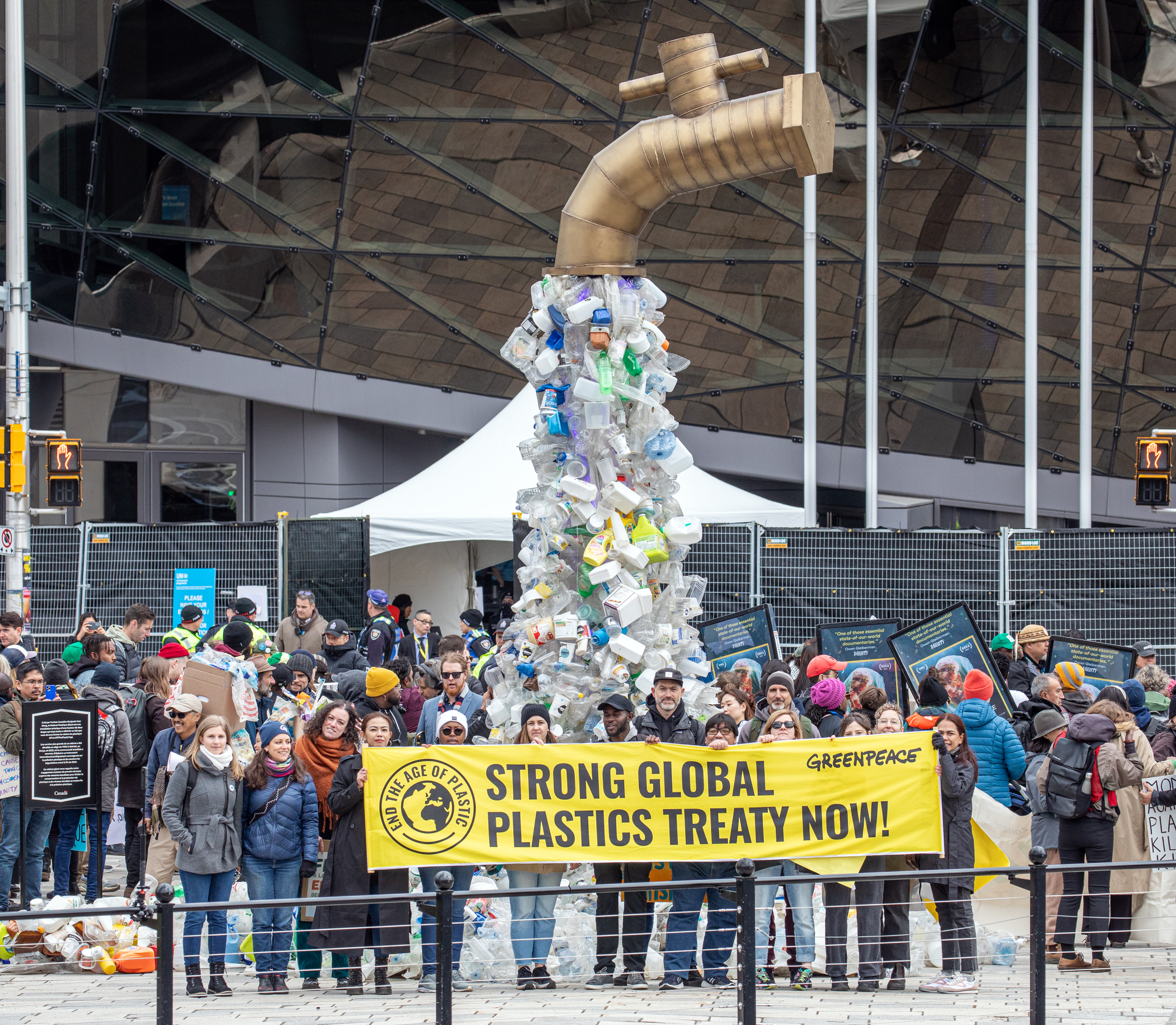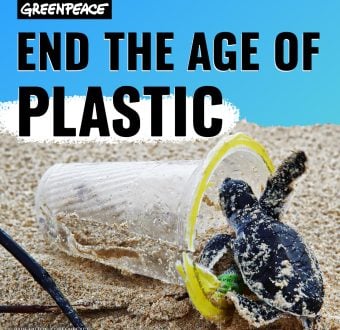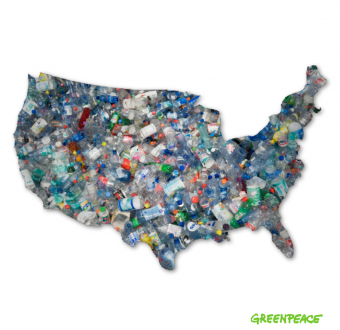Washington, DC (April 23, 2024)-A global treaty that cuts plastic production and ends single-use plastic pollution is still within reach, and governments have a duty to do all they can to secure it, said Greenpeace International and the Descendants Project at a press conference today. Campaigners and activists from impacted communities said Member States, including the United States, must ensure the fourth Intergovernmental Negotiating Committee (INC-4) meeting in Ottawa this week secures an ambitious Global Plastics Treaty that reduces plastic production and ends single-use plastics.
Sarah King, Head of Oceans and Plastics Campaigns for Greenpeace Canada, said: “As host country, Canada can show leadership by setting the right tone for the talks ahead and working with other high-ambition countries to champion the strongest possible measures. Public calls for bold action are getting louder, and this is Canada’s moment to heed those calls and help move us towards the impactful Plastics Treaty outcome people and the planet desperately need.”
Jo Banner, Co-Director of an environmental justice advocacy organization, the Descendants Project, said: “As a resident of Louisiana’s Cancer Alley, I experience first-hand the devastating impact plastic production has on the health and environment of Frontline communities. A treaty failing to limit plastic production is a continuation of our country’s deadly tradition, which harkens back to the days of the enslavement of my ancestors, of enriching others through the sacrificing of Black bodies, other people of color, and low-income communities.”
In a collaborative effort, Greenpeace USA, along with 22 other organizations, including the Descendants Project, recently penned a letter to President Biden requesting a discussion on the pressing concerns of communities most impacted by the toxic pollution stemming from the American Chemistry Council (ACC) and its affiliated plastics industry giants, such as Dow, Exxon, and Dupont.
John Hocevar, Greenpeace USA’s Ocean Campaign Director, who is attending the negotiations said: “Millions of people worldwide are demanding solutions to the plastic pollution crisis. President Biden faces a crucial decision: prioritize people or perpetuate plastic pollution. If the U.S. only supports measures that are already part of federal law, the treaty will falter. The President has made commitments to advance environmental justice, combat cancer with a “moon shot” initiative, and strengthen air quality standards while creating green jobs. Securing a strong Plastics Treaty would help solidify his legacy of effective action on environmental justice and climate change. We urge President Biden to demonstrate true leadership, listen to the voices of the people, and embark on this transformative journey towards a plastic-free future for generations to come.”
Last February, the Biden Administration acknowledged the need to end plastic pollution by 2040. However, the current stance of the State Department, which asserts that the U.S. cannot support measures requiring states to go beyond existing federal law, poses a significant threat to undermine the strength of the Treaty to resolve the plastic crisis in accordance with what science and environmental justice demands. The position favors the interest of major oil and gas corporations over the imperative to limit their production, hindering efforts to protect public health and the environment.
A recent Greenpeace International poll report revealed that 8 out of 10 people support cutting plastic production. The survey which was conducted across 19 countries also indicates overwhelming public backing for measures aimed at ending single-use plastics and promoting reuse-based solutions.
The implications are dire, as more than 3,200 identified chemicals found in plastics have been associated with severe health concerns, including cancer, nervous system disorders, and hormonal imbalances. These health concerns not only jeopardize the well-being of millions of Americans but also strain the U.S. economy with hundreds of billions of dollars in increased costs due to rising disease rates. A strong global treaty is essential for people here in the U.S. and around the world.
Greenpeace International demands that INC-4 member states:
- Ensure that an option for a global target to reduce primary plastic polymer production is retained in the text. There is a risk that as we begin serious negotiations on text that ambitious countries will concede to bad-faith countries in this area.
- Ensure that targets for reduction, reuse, and refill are retained as an option in the text.
- Given the slow progress so far, Member States must move into actual negotiation of the treaty text. A first step will be states working to consolidate the many options in the revised Zero Draft, and we are expecting states to submit in-session documents like conference room papers (CRPs) with concrete proposals.
- Ensure that there is a mandate to create the first draft of the treaty text, which was one of the failures of INC-3 held last November 2023 in Nairobi, Kenya.
###
Notes:
Greenpeace demands for a Global Plastics Treaty can be found here.
Photos and videos are available from the Greenpeace Media Library.
Contact: Tanya Brooks, Greenpeace USA Senior Communications Specialist, P: 703-342-9226, E: [email protected]
Angelica Carballo Pago, Global Plastics Campaign Media Lead, Greenpeace USA
[email protected] , +63 917 1124492 (also in Ottawa, Canada)
Greenpeace International Press Desk, +31 (0)20 718 2470 (available 24 hours), [email protected]
Greenpeace USA is part of a global network of independent campaigning organizations that use peaceful protest and creative communication to expose global environmental problems and promote solutions that are essential to a green and peaceful future. Greenpeace USA is committed to transforming the country’s unjust social, environmental, and economic systems from the ground up to address the climate crisis, advance racial justice, and build an economy that puts people first. Learn more at www.greenpeace.org/usa.


